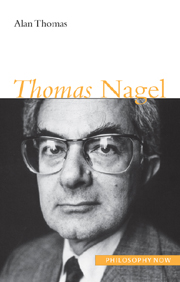Book contents
- Frontmatter
- Contents
- Preface
- Abbreviations
- 1 Subjective and objective
- 2 Understanding, knowledge and reason
- 3 Placing the mind in the physical world
- 4 The possibility of altruism
- 5 Practical objectivity, freedom and a realistic autonomy
- 6 Normative ethics: Nagel's hybrid ethical theory
- 7 Justice, equality and partiality
- Conclusion
- Notes
- Bibliography
- Index
1 - Subjective and objective
- Frontmatter
- Contents
- Preface
- Abbreviations
- 1 Subjective and objective
- 2 Understanding, knowledge and reason
- 3 Placing the mind in the physical world
- 4 The possibility of altruism
- 5 Practical objectivity, freedom and a realistic autonomy
- 6 Normative ethics: Nagel's hybrid ethical theory
- 7 Justice, equality and partiality
- Conclusion
- Notes
- Bibliography
- Index
Summary
This chapter will begin to characterize the central dichotomy that gives Thomas Nagel's work its unified character, namely, the dichotomy of the subjective versus the objective. It will describe Nagel's conception of the aims of philosophy, introduce some concepts necessary to understand the idea of a representation from a point of view, explain the idea of the radically perspectival and discuss whether Nagel is committed to the controversial idea of a perspectival fact. This material will provide the framework for the discussions in the remainder of this book.
Nagel's aims
What is the point of philosophizing? Nagel's view is that the point is to live reflectively in the light of the truth (VN: 1–5). That sounds like a description of any philosopher's aims. However, Nagel's view is distinctive in that (like Kant and Wittgenstein) he believes that there is an aspect of our nature that leads us away from this ideal. According to Nagel we have an inner drive towards philosophical error. That drive is caused by our internally conflicted human nature. The effect that this inner division has on our attempts to philosophize is described as follows:
What really happens in the pursuit of objectivity is that a certain element of oneself, the impersonal or objective self, which can escape from the specific contingencies of one's creaturely point of view, is allowed to predominate. Withdrawing into this element one detaches from the rest and develops an impersonal conception which one has detached. That creates the new problem of reintegration … One has to be the creature whom one has subjected to detached examination, and one has in one’s entirety to live in the world that has been revealed to an extremely distilled fraction of oneself.
(VN: 9)- Type
- Chapter
- Information
- Thomas Nagel , pp. 1 - 30Publisher: Acumen PublishingPrint publication year: 2008



